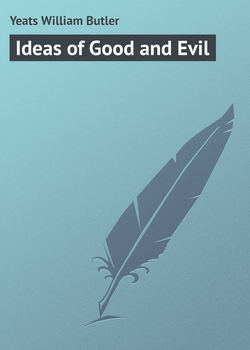Читать книгу Ideas of Good and Evil - Yeats William Butler, William Butler Yeats - Страница 12
THE HAPPIEST OF THE POETS
II
ОглавлениеI do not think it was accident, so subtle are the threads that lead the soul, that made William Morris, who seems to me the one perfectly happy and fortunate poet of modern times, celebrate the Green Tree and the goddess Habundia, and wells and enchanted waters in so many books. In The Well at the World’s End green trees and enchanted waters are shown to us, as they were understood by old writers, who thought that the generation of all things was through water; for when the water that gives a long and a fortunate life and that can be found by none but such a one as all women love is found at last, the Dry Tree, the image of the ruined land, becomes green. To him indeed as to older writers Well and Tree are all but images of the one thing, of an ‘energy’ that is not the less ‘eternal delight’ because it is half of the body. He never wrote, and could not have written, of a man or woman who was not of the kin of Well or Tree. Long before he had named either he had made his ‘Wanderers’ follow a dream indeed, but a dream of natural happiness, and all the people of all his poems and stories from the confused beginning of his art in The Hollow Land to its end in The Sundering Flood, are full of the heavy sweetness of this dream. He wrote indeed of nothing but of the quest of the Grail, but it was the Heathen Grail that gave every man his chosen food, and not the Grail of Malory or Wagner; and he came at last to praise, as other men have praised the martyrs of religion or of passion, men with lucky eyes and men whom all women love.
We know so little of man and of the world that we cannot be certain that the same invisible hands, that gave him an imagination preoccupied with good fortune, gave him also health and wealth, and the power to create beautiful things without labour, that he might honour the Green Tree. It pleases me to imagine the copper mine which brought, as Mr. Mackail has told, so much unforeseen wealth and in so astonishing a way, as no less miraculous than the three arrows in The Sundering Flood. No mighty poet in his misery dead could have delighted enough to make us delight in men ‘who knew no vain desire of foolish fame,’ but who thought the dance upon ‘the stubble field’ and ‘the battle with the earth’ better than ‘the bitter war’ ‘where right and wrong are mixed together.’ ‘Oh the trees, the trees!’ he wrote in one of his early letters, and it was his work to make us, who had been taught to sympathize with the unhappy till we had grown morbid, to sympathize with men and women who turned everything into happiness because they had in them something of the abundance of the beechen boughs or of the bursting wheat-ear. He alone, I think, has told the story of Alcestis with perfect sympathy for Admetus, with so perfect a sympathy that he cannot persuade himself that one so happy died at all; and he, unlike all other poets, has delighted to tell us that the men after his own heart, the men of his News from Nowhere, sorrowed but a little while over unhappy love. He cannot even think of nobility and happiness apart, for all his people are like his men of Burg Dale who lived ‘in much plenty and ease of life, though not delicately or desiring things out of measure. They wrought with their hands and wearied themselves; and they rested from their toil and feasted and were merry; to-morrow was not a burden to them, nor yesterday a thing which they would fain forget; life shamed them not nor did death make them afraid. As for the Dale wherein they dwelt, it was indeed most fair and lovely and they deemed it the Blessing of the earth, and they trod the flowery grass beside its rippled stream amidst the green tree-boughs proudly and joyfully with goodly bodies and merry hearts.’
